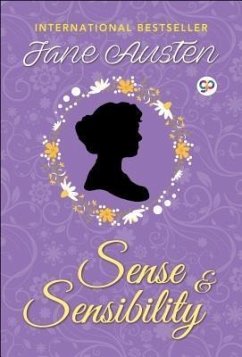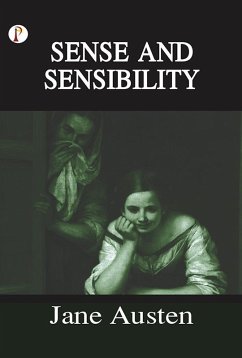
Sense and Sensibility (eBook, ePUB)

PAYBACK Punkte
0 °P sammeln!
This is a story of the English moneyed class and its eternal struggle for creating "sense and sensibility" in its world. A potential marriage prospect must make "sense" by bringing with it enough assets and income to permit the couple to continue to live in happy, idle leisure, complete with servants and a prestigious address. Provided one can find such a match among the eligible persons of the opposite sex, one then hopes for "sensibility", or capacity for emotion, so that if love is not immediately to hand, it might come around later. And while these gentlemen and ladies make their hopeful p...
This is a story of the English moneyed class and its eternal struggle for creating "sense and sensibility" in its world. A potential marriage prospect must make "sense" by bringing with it enough assets and income to permit the couple to continue to live in happy, idle leisure, complete with servants and a prestigious address. Provided one can find such a match among the eligible persons of the opposite sex, one then hopes for "sensibility", or capacity for emotion, so that if love is not immediately to hand, it might come around later. And while these gentlemen and ladies make their hopeful pirouettes in the social eye, they must of course adhere to all the forms of civility. Jane Austen writes of the family of a gentleman named Dashwood who dies and leaves most of his fortune to his son, with the understanding that he will "look out for" his mother and three sisters. When that son marries a grasping woman who convinces him that his sisters' funds are suitable to their needs and so require no contributions from his inherited fortune, the sisters are left to play the game of "Sense and Sensibility" in earnest. But all's not fair in love. Carefully prepared "attachments" can and do go awry when gentlemen find other young women of greater fortunes than the Dashwood sisters. So, will they marry for love? Or money? Or perhaps, not at all? The Dashwood sisters are very different from each other in appearance and temperament; Elinor's good sense and readiness to observe social forms contrast with Marianne's impulsive candor and warm but excessive sensibility. Both struggle to maintain their integrity and find happiness in the face of a competitive marriage market.
ABOUT THE AUTHOR:
Jane Austen was an English novelist whose works of romantic fiction, set among the landed gentry, earned her a place as one of the most widely read writers in English literature, her realism and biting social commentary cementing her historical importance among scholars and critics.
Austen lived her entire life as part of a close-knit family located on the lower fringes of the English landed gentry. She was educated primarily by her father and older brothers as well as through her own reading. The steadfast support of her family was critical to her development as a professional writer. Her artistic apprenticeship lasted from her teenage years until she was about 35 years old. During this period, she experimented with various literary forms, including the epistolary novel which she tried then abandoned, and wrote and extensively revised three major novels and began a fourth. From 1811 until 1816, with the release of 'Sense and Sensibility' (1811), 'Pride and Prejudice' (1813), 'Mansfield Park' (1814) and 'Emma' (1815), she achieved success as a published writer. She wrote two additional novels, 'Northanger Abbey' and 'Persuasion', both published posthumously in 1818, and began a third, which was eventually titled 'Sanditon', but died before completing it.
Austen's works critique the novels of sensibility of the second half of the 18th century and are part of the transition to 19th-century realism. Her plots, though fundamentally comic, highlight the dependence of women on marriage to secure social standing and economic security. Her work brought her little personal fame and only a few positive reviews during her lifetime, but the publication in 1869 of her nephew's 'A Memoir of Jane Austen' introduced her to a wider public, and by the 1940s she had become widely accepted in academia as a great English writer. The second half of the 20th century saw a proliferation of Austen scholarship and the emergence of a Janeite fan culture.
ABOUT THE AUTHOR:
Jane Austen was an English novelist whose works of romantic fiction, set among the landed gentry, earned her a place as one of the most widely read writers in English literature, her realism and biting social commentary cementing her historical importance among scholars and critics.
Austen lived her entire life as part of a close-knit family located on the lower fringes of the English landed gentry. She was educated primarily by her father and older brothers as well as through her own reading. The steadfast support of her family was critical to her development as a professional writer. Her artistic apprenticeship lasted from her teenage years until she was about 35 years old. During this period, she experimented with various literary forms, including the epistolary novel which she tried then abandoned, and wrote and extensively revised three major novels and began a fourth. From 1811 until 1816, with the release of 'Sense and Sensibility' (1811), 'Pride and Prejudice' (1813), 'Mansfield Park' (1814) and 'Emma' (1815), she achieved success as a published writer. She wrote two additional novels, 'Northanger Abbey' and 'Persuasion', both published posthumously in 1818, and began a third, which was eventually titled 'Sanditon', but died before completing it.
Austen's works critique the novels of sensibility of the second half of the 18th century and are part of the transition to 19th-century realism. Her plots, though fundamentally comic, highlight the dependence of women on marriage to secure social standing and economic security. Her work brought her little personal fame and only a few positive reviews during her lifetime, but the publication in 1869 of her nephew's 'A Memoir of Jane Austen' introduced her to a wider public, and by the 1940s she had become widely accepted in academia as a great English writer. The second half of the 20th century saw a proliferation of Austen scholarship and the emergence of a Janeite fan culture.
Dieser Download kann aus rechtlichen Gründen nur mit Rechnungsadresse in A, D ausgeliefert werden.












